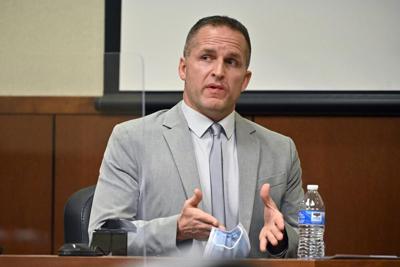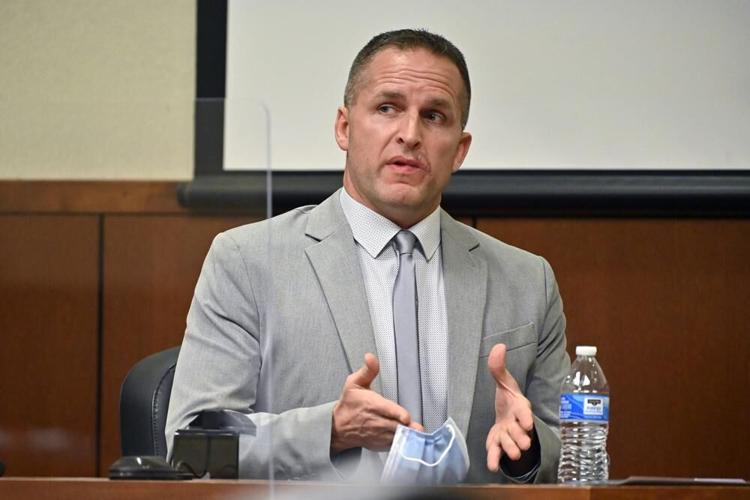LOUISVILLE, Ky. (WDRB) – Federal prosecutors are criticizing attorneys representing former Louisville police Detective Brett Hankison for “character assassination of a dead victim" after they suggested Breonna Taylor could have been involved in selling drugs and may have talked with drug dealers shortly before police killed her during a March 13, 2020 raid.
The fiery response from the U.S. District Attorney’s office filed Aug. 1 also accuses defense attorneys of providing "erroneous" information to the judge when they recently requested access to Taylor’s phone.
The defense believes the phone may contain evidence Taylor was given advance warning of the 2020 raid from drug dealers also being raided by police that night.
Defense attorneys also said Taylor’s phone could “correct the record” on whether Taylor was involved in selling drugs or holding money for dealers, in particular a former boyfriend.
In their response, prosecutors said there is “no evidence that Ms. Taylor––an emergency medical technician with no criminal record––was involved in drug dealing, nor does it advance any reason to think such evidence would be found on her phone.”
The prosecution claimed the arguments put forth by Hankison’s attorneys were “beyond speculation” and called them baseless “inflammatory allegations.”
In addition, prosecutors said defense attorneys misled the judge when they claimed police officers at the scene may have disabled Taylor’s cellphone by repeatedly entering incorrect passwords. Defense attorneys also misinformed the judge when claiming they didn’t learn the phone was damaged until June of this year, prosecutors said.
Taylor’s phone was more likely damaged by a “forensic examiner working for the state -- who is now the defendant’s own expert” after he entered incorrect passcodes before the phone was taken into FBI custody, according to the response by the U.S. Attorney’s office. Defense attorneys were provided with that information in 2022.
Meanwhile, Hankison’s attorneys have claimed that the government has failed to produce requested information on who, when and how Taylor's phone was tampered with and why information on the phone is no longer accessible.
They have asked a judge to force prosecutors to turn over the cellphone to their expert.
Prosecutors responded that the phone has been examined by state forensic examiners who were unsuccessful in their attempts to extract data from the phone and remove the SIM card, according to court documents.
The prosecution argues the defense has been told multiple times that data cannot be extracted from Taylor’s phone because of the condition the phone was in when the FBI took custody of it.
The government also said that Taylor's phone does not contain important evidence as records show there were no incoming or outgoing phone calls or text messages in the four hours before the shooting or in the 15 minutes after.
In their response, the government asked the judge to deny the request to turn over Taylor’s phone, arguing there is no usable evidence available on it and “would risk further compromising the phone’s integrity.”
Attorneys for Hankison want their own expert to determine if messages were sent another way, such as through FaceTime, Facebook messenger, Instagram, Snapchat, TikTok, Twitter or other social media platforms.
Hankison's attorneys claim that about 15 minutes elapsed between the first searches and that of Taylor's apartment, meaning there was "more than enough time" for others to notify her, including the main target of the investigation and her former boyfriend, Jamarcus Glover.
This is important, the defense argues, in determining whether Taylor and her then-boyfriend, Kenneth Walker, knew police might be coming or were surprised when police burst in, prompting Walker to fire a shot that led to officers firing back and killing Taylor, 26.
In 2020, police sought out a search warrant for Taylor's home as part of a broader investigation that focused on Glover. Police believed Glover may have been using Taylor's apartment to receive drugs and store money.
Kenneth Walker admitted to firing at police as they entered the apartment but claimed he believed the officers were intruders. He hit former officer Jonathan Mattingly.
Multiple Louisville Metro Police officers returned fire, killing Taylor.
One of the key disputes in the case is whether police burst in, surprising Taylor and Walker, or whether they knocked and announced their presence repeatedly.
While police had a "no-knock" warrant signed by a judge, meaning they were not required to knock or announce themselves before entering the apartment, officers claim they did both multiple times.
But Walker and several neighbors said they never heard police knock or announce their presence, prompting the shooting.
Hankison's attorneys have asked the judge to allow their expert one hour to "independently verify that the iPhone is compromised," according to the motion. "Given what is at stake, this is a very reasonable and appropriate request."
No date has been set for a hearing over the request.
This will be Hankison's third trial related to his actions the night of the raid. A federal jury in November 2023 deadlocked on two counts of civil rights violations and using excessive force.
A state Jefferson Circuit Court jury in March 2022 found Hankison not guilty on three counts of wanton endangerment.
The federal case is about Hankison firing 10 times from outside Taylor's apartment through a covered sliding glass door and blinded windows in Taylor's bedroom window, with three bullets flying into an adjacent apartment where Cody Etherton, Chelsey Napper and her 5-year-old child lived.
During the federal trial, LMPD officers testified that Hankison's actions on the night of the Taylor raid were "shocking," unfathomably dangerous" and "stomach churning," the prosecution said in closing arguments.
He fired "blindly, spraying bullets through two covered windows, ripping through walls into a neighboring apartment" where a family and a child were sleeping, said prosecutor Michael Songer, with the U.S. Department of Justice, in his closing arguments.
Former defense attorney Stew Mathews told jurors have to put themselves in Hankison's shoes at the time, think about what he was seeing and experiencing as an officer was shot and dozens of bullets were fired after they burst into Taylor's home.
"If someone fires at the police, the police are going to fire back at you, and that's exactly what happened here," Mathews said.
Hankison testified he wasn't part of the investigation leading up to the raid and didn't even know the adjacent apartment was there. All Hankison knew was that fellow officers were under fire, he believed from an assault rifle, and that one officer had been shot.
He admitted he was mistaken, and the muzzle flashes were actually coming from Mattingly and Det. Myles Cosgrove, and that Walker only fired one shot from a handgun at police.
"Was I wrong that Mr. Walker shot more than one shot? I know that now," Hankison testified. "I fired to stop the threat, sir."
But he said if given a chance for a do-over, he "would do the exact same thing" because he was trying to save the lives of his fellow officers.
Related Stories:
- Former Louisville police detective Brett Hankison seeks order for access to Breonna Taylor's phone
- Ky. Court of Appeals upholds termination of Louisville detective who fired fatal shot in Breonna Taylor raid
- Call for change | Louisville activists reflect on death of Breonna Taylor 4 years later
- 'Breonna Taylor Act' for US ban on no-knock warrants reintroduced on Capitol Hill
Copyright 2024 WDRB Media. All Rights Reserved.














